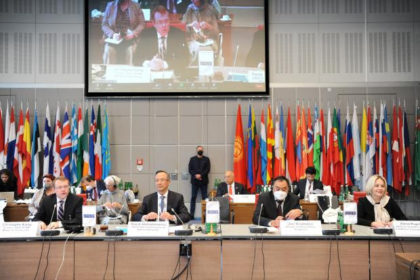OSCE HCNM Policing Recommendations remain relevant 15 years after publication, say speakers at anniversary conference
VIENNA, 5 November 2021 – A holistic approach to policing needs to be considered when maintaining public safety in diverse societies, said OSCE High Commissioner on National Minorities Kairat Abdrakhmanov at a conference marking the 15th anniversary of the Recommendations on Policing in Multi-Ethnic Societies (Policing Recommendations), held today in the Hofburg in Vienna.
“At the same time, there is no one-size-fits-all solution. Each situation is unique and approaches should be adapted to contexts”, he emphasized. “The Policing Recommendations provide advice to policymakers on how to recruit, train and develop police services that are representative of the society they serve.”
“The Recommendations also provide guidance on how to enhance communication and trust between the police and national minority communities, thereby strengthening inter-ethnic relations, as well as increasing the operational effectiveness of the police,” Abdrakhmanov said.
In his welcoming address, Håkan Jevrell, Ambassador and Special Envoy on Organized Crime for the Swedish 2021 OSCE Chairperson-in-Office, said: “The OSCE has unique assets in its autonomous institutions, including the High Commissioner on National Minorities. The Recommendations and Guidelines published by the HCNM, including the Recommendations on Policing in Multi-Ethnic Societies, are an important tool in supporting the participating States to address these challenges and to implement our joint commitments in this area.”
Alena Kupchyna, the OSCE Co-ordinator of Activities to Address Transnational Threats, emphasized that “the implementation of the HCNM’s Policing Recommendations is as relevant today as it was when they were published 15 years ago, as the document aims to address both the short-term triggers of inter-ethnic tension and conflict and any-long term structural concerns. Many police reform processes are ongoing in the OSCE area and the Transnational Threats Department (TNTD) stands ready to join efforts with the HCNM to provide participating States with comprehensive expertise on how police can better serve in multi-ethnic societies. The full use of the Recommendations can result in the inclusion of minority aspects in law-enforcement activities and support building lasting partnerships, based on trust.”
Speaking by video link, United States Senator Ben Cardin, Chairman of the Commission on Security and Cooperation in Europe (US Helsinki Commission), said: “Recent events make clear that the High Commissioner on National Minorities’ Recommendations on Policing and Multi-Ethnic Societies, which outline ways to make law enforcement more representative and encourage enhanced co-operation and trust between law enforcement and the communities they serve throughout the OSCE region, are as relevant today as they were 15 years ago.
“Strengthening co-operation between law enforcement and civil society, providing assistance to victims, and promoting democracy and equal opportunity must become key aspects of the OSCE efforts to address intolerance in the region,” he added.
Ulan Niiazbekov, Internal Affairs Minister of the Kyrgyz Republic, said his Ministry paid particular attention to enhancing co-operation between police and minority communities in Kyrgyzstan.
The conference was an opportunity to discuss the key principles of policing in diverse societies and to exchange experiences and good practices in applying the Recommendations across the OSCE region today.
Dedicated sessions and panels discussed incentives and impediments for the representation of national minorities in the police services and how to enhance trust and communication between the police and diverse communities. They exchanged views on operational methods, professional development needs and measures to ensure the effective role of the police in promoting inter-ethnic relations as part of their law-enforcement duties.
Participants reflected on how the Policing Recommendations tackle racial profiling, cybersecurity and surveillance technology that may target specific groups in society. They also explored issues such as polarization and divisive and identity politics, and how they shape attitudes towards the police, and police responses.
The importance of countering hate speech, xenophobic rhetoric and hate crimes, particularly against minorities, was reiterated. Participants discussed the importance of preventing and countering violent extremism and radicalization that lead to terrorism (P/C VERLT) while taking care not to securitize or marginalize minorities.
The participants also exchanged best practices and ideas on how to mainstream gender in policing from the perspective of the HCNM’s early warning and conflict prevention mandate.
